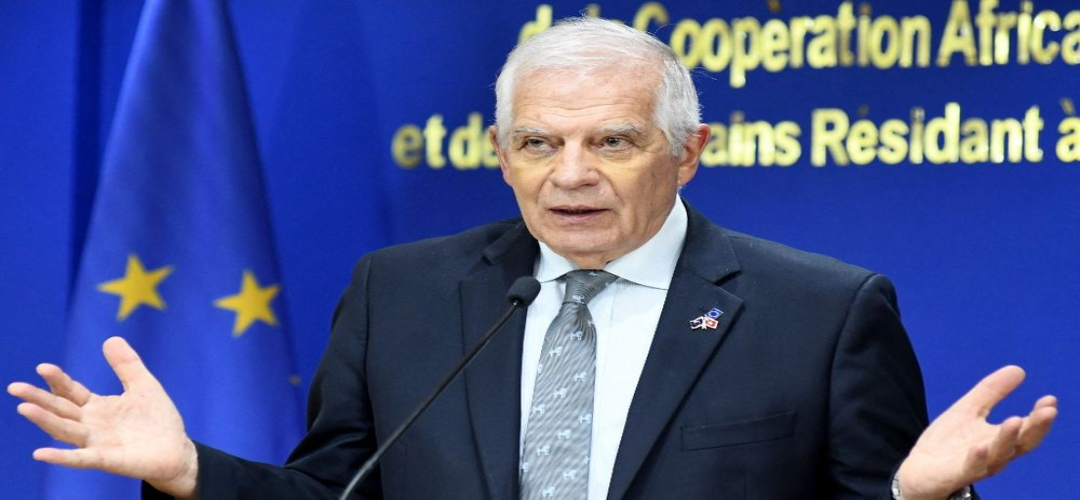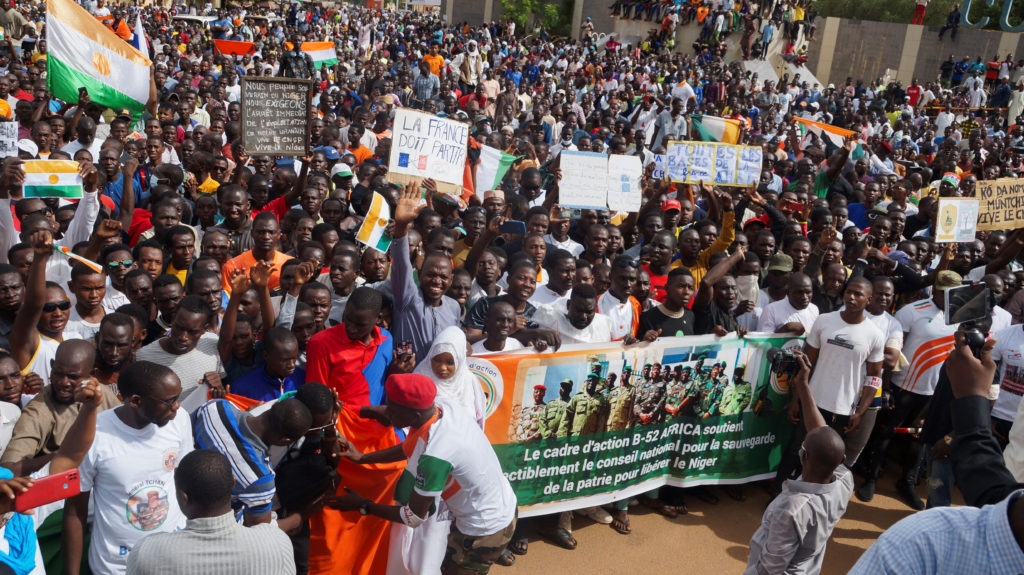EU Piles on the Pressure!
October 29, 2023 | Expert Insights

In a significant move, the European Union Council announced on October 23, 2023, that it would impose sanctions on the ruling junta in Niger. This decision comes in response to the junta's failure to hold promised elections and its continued repression of dissent.
This move should not come as a surprise as retaliation was expected once, following weeks of pressure from the military junta, and the public, France was forced to withdraw from Niger early this month. In fact, this withdrawal follows its forced exit from neighbouring Burkina Faso and Mali. Since France acted as the forward sentinel of Western powers in the Sahel region, its departure leaves a gaping hole in the West's efforts to control the decade-old Islamist insurgency. Even more worrying is that in the vacuum created, the Wagner group, now directly under the control of the Kremlin, is rapidly filling the space.
It may be recollected the chain of events was triggered by the January military coup overthrowing the pro-France democratically elected government of President Mahamadou Issoufou. While promising elections within 18 months, the junta has since reneged on that commitment. Recent months have witnessed a crackdown on dissent, with journalists, activists, and opposition politicians arrested and imprisoned. Furthermore, restrictions on freedom of expression and assembly have been imposed.
Background
The EU's condemnation of the coup d'état in Niger and its intention to mirror and strengthen any measures taken by the West African regional body ECOWAS is a significant development. It is a clear signal to the junta that the international community will not tolerate its actions and that there will be consequences for its coup. The EU's foreign policy chief, Josep Borrell, said the move "sends a clear message: military coups bear costs." This is a reference to the fact that the EU and ECOWAS have a range of tools at their disposal to punish the junta, including sanctions, economic isolation, and diplomatic pressure.
The sanctions comprising the Common Foreign and Security Policy (CFSP) of the European Union are designed to resolve a variety of concerns, including violations of human rights, democracy, and security. They will include asset freezes, investment bans, travel restrictions, armament embargoes, and trade restrictions.
Asset restrictions encompass the act of restricting access to investments and bank accounts that are owned by entities and individuals. Travel bans impede the liberty of movement of individuals, prohibiting their access to or departure from the European Union. The transmission and export of weaponry and military equipment to or from a specific nation is prohibited by arms embargoes. Quotas or tariffs may be implemented as trade restrictions on products exchanged with a particular country. Investment restrictions prohibit investments in specific sectors of an economy or in a nation as a whole.
The sanctions levied against Niger by the European Union comprise an all-encompassing array of measures. The travel restrictions and asset freezes are expected to impede the junta's ability to obtain financial resources and engage in international travel. Furthermore, the arms embargo is strategically formulated to impede the junta's capacity to procure fresh weaponry and sustain its security forces.

Analysis
The threat is undoubtedly serious, but it will be interesting to see how it pans out. With over 90 per cent of the population engaged in subsistence farming, there is little scope for any industrial activity or investments that can be targeted for sanctions.
For decades, countries in the Sahel region have depended upon international aid, with the EU being its top donor. As per the European Commission web page, EU humanitarian assistance to the Sahel region last year exceeded €240 million. The magnitude of the humanitarian crisis can be gleaned from the fact that last year, 22.8 million people in Burkina Faso, Cameroon, Chad, Mali, Mauritania and Niger were entirely dependent on foreign aid for their survival; this year, the numbers would only go up.
The move could be to shore up the influence of regional bodies like ECOWAS that have been making frantic efforts to restore elected presidents to power. Western powers have long tried to prop up regional bodies like ECOWAS to outsource peacekeeping in the African continent. The current action is a strong signal to the junta that it cannot expect to drive a wedge between regional bodies and its western supporters and escape retribution for such defiance. The EU has to take a strong stand if it wants to deter future coups. After all, these governments are accountable to their respective taxpayers for all the aid they have been sinking into the Sahel.
The West has long argued that its interest in this desperately poor region is entirely humanitarian and wishes to nurture democratic systems here. On the other hand, the local politicians who oppose West-supported governments accuse the West of neo-colonialism, pointing out that large Western companies are heavily engaged in mining precious metals and rare earth from the region. They see no difference in the West, EU and even the UN (which has been spending billions in maintaining peacekeepers), calling them forces working for Western interests rather than their own. ECOWAS is tarred with the same brush as a ‘lackey doing the biddings of the West.’
Taking a leaf from the sanctions imposed on Russia in the initial stages of the conflict, the EU is targeting individuals and entities in Niger accountable for the junta's violations of human rights and its breach of its electoral obligations. These may be escalated to the next level, including severance of diplomatic relations, recall of ambassadors and expulsion of embassy staff. This will impact development assistance to the targeted country.
Such actions cannot be unmindful of their debilitating effect on economies already hanging over the abyss by a slender thread. To mitigate the negative effects on the Nigerien population, the EU has taken steps to provide humanitarian assistance and has exempted certain types of trade from the sanctions. However, these measures may discourage foreign investment and trade, which could result in employment losses and a rise in consumer prices.
The EU's sanctions on Niger and France's withdrawal from the Sahel region represent two distinct approaches to addressing security challenges in the area. The EU adopts a punitive approach, while France opts for a more hands-off stance. The effectiveness of these approaches is yet to be determined. Still, it is evident that collaboration between the EU and France, along with other international partners, is essential to devise a comprehensive strategy to address Sahel's security challenges effectively.
However, it is crucial to acknowledge that the EU's sanctions alone may not restore the status quo ante in the region. A coordinated strategy involving international partners, including the African Union and the United Nations, is imperative to address the multifaceted security challenges in the Sahel region. As long as China and Russia play their games, the military juntas will not be incentivised to restore democracy.
Assessment
- The imposition of sanctions by the EU on Niger is a desperate move, emphasising the lack of leverage that the EU's enjoys despite pouring millions of aid into the region. In their effort to selectively target individuals and entities, the sanction may be nothing more than an ineffective threat. It will take something more robust for the Generals and Colonels to relent.
- While Niger is the target, the message is for the entire region. How the sanction regime plays out here would be the key to its success in returning to the status quo ante. Even though the ECOWAS and African Union have so far failed to work out a solution, their participation in a common strategy with the EU under the banner of the UN is the only logical way forward.
- It is encouraging that the EU continues to support the Nigerien people during this challenging period, providing humanitarian, financial, and technical assistance. Additionally, collaborative efforts to restore democracy in Niger should be a priority. The question to ponder is how much of this aid will actually reach the needy and not land under the control of the military junta.








Comments